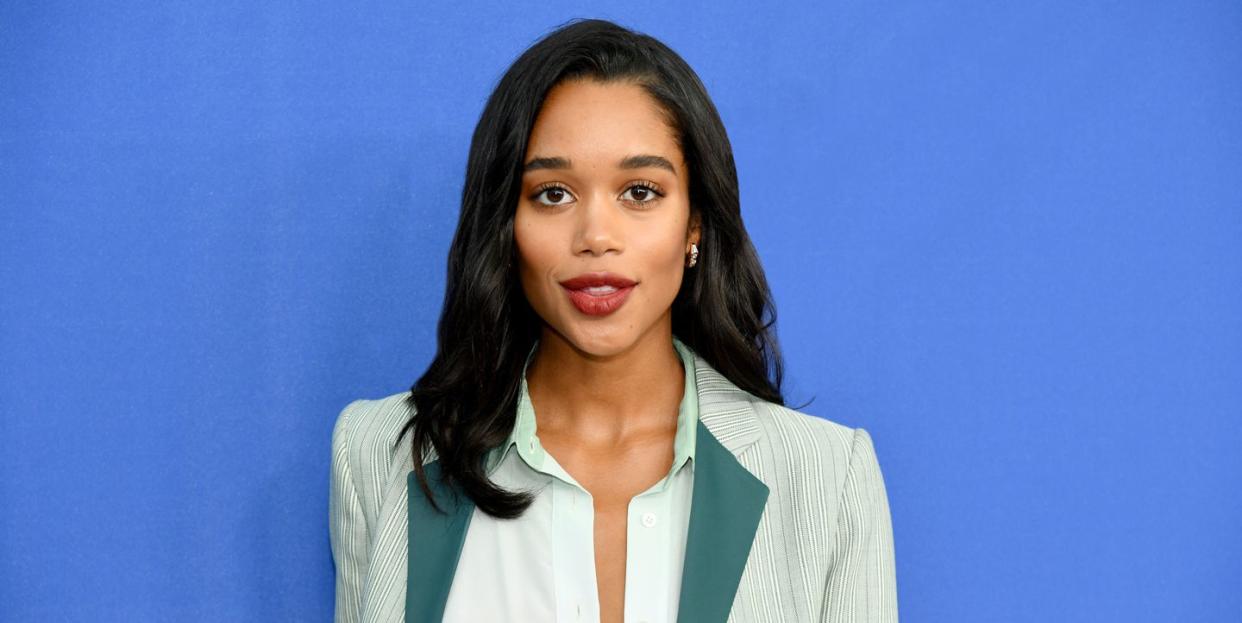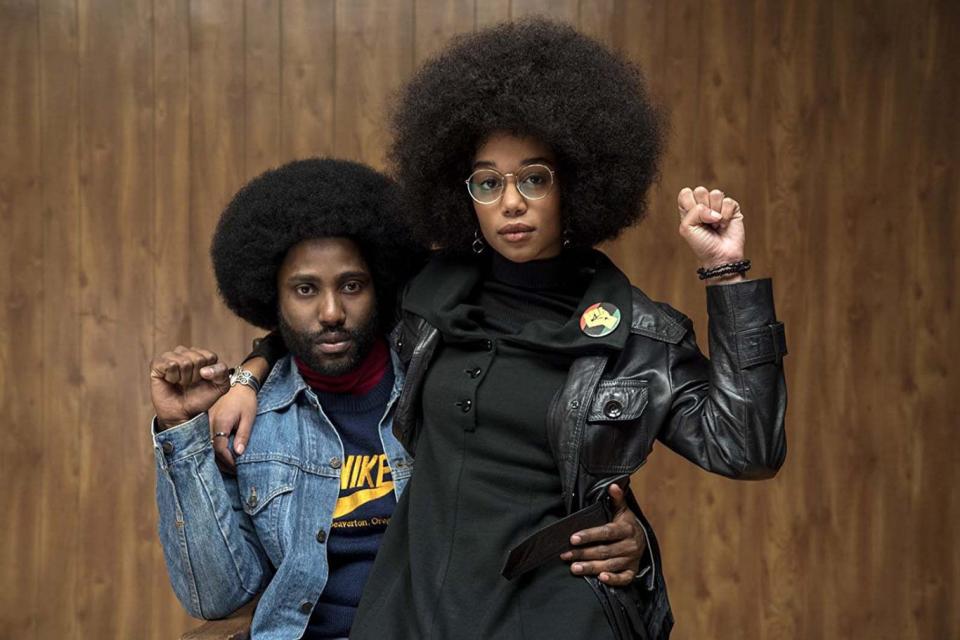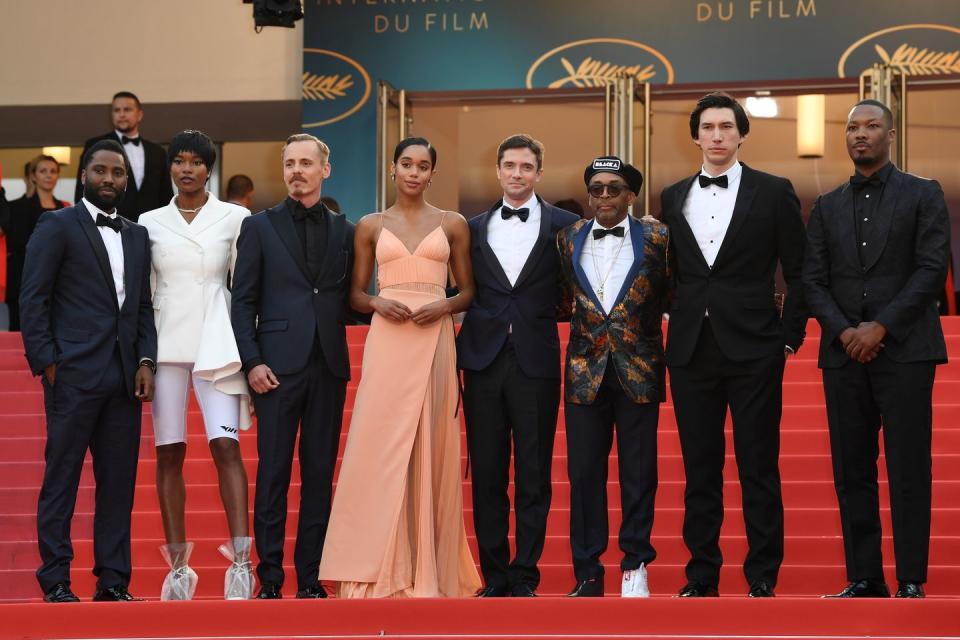‘BlacKkKlansman’ Scene-Stealer Laura Harrier on Spike Lee and Redefining Strong Female Characters

This post contains spoilers about BlacKkKlansman, currently out in limited release. The film expands to additional markets Friday, Aug. 17.
Last summer, Laura Harrier made her feature film debut playing Spider-Man’s former love interest Liz Toomes in Spider-Man: Homecoming. Then she went to a random island in Greece with some friends, but the vacation was quickly interrupted by a phone call.
It was Spike Lee, asking her to meet for a film he was making. “He goes, ‘Vacation’s over. See you Thursday. Bye.’ He hung up, so I had to go back to New York,” Harrier tells me approximately one year after the phone call at a press junket for BlacKkKlansman.
“When Spike Lee calls you, you show up,” she says. “I was reading my scenes with him, acting with Spike. We got into a fight, I walked out of the room, I came back, he was still going. It was the most insane audition. The next day he called me and offered me the role. It was not normal at all.”
The role was Patrice Dumas, a fictional student activist and member of the Black Student Union at Colorado College in the 1970s. The film is BlackKklansman, based on the true story of how Ron Stallworth, the first African-American detective in the Colorado Springs Police Department, infiltrated the Ku Klux Klan in an undercover mission.
BlackKklansman is funny, shocking, bold, and eerily relevant to 2018, with powerful performances from Harrier and on-screen love interest John David Washington (son of Denzel), who plays Stallworth. Adam Driver and Topher Grace round out the cast as a fellow detective and Klan leader David Duke, respectively. In May, the film won the Grand Prix award at Cannes and has since generated plenty of Oscar buzz.

Below, Harrier opens up about her hardest scene to film, her other co-star, Harry Belafonte, and the most hard-to-watch moment of the movie:
On the research she did for Patrice:
"She was actually kind of a mix of a lot of different women, Angela Davis being one of them. I didn’t get to meet her but I did get to meet Kathleen Cleaver, who was a really big figure of the Black Panthers-she was married to Eldridge, who was one of the founding members. Spike had us meet her, and I got to ask her questions and learn about her life. It was really amazing. I also took influence from lesser known figures of the Black Power Movement. I interviewed [people] who were in the BSU at Colorado College in the ‘70s as well, just kind of trying to get people’s stories and painting a full picture of what the time was like then."
On being one of the few female characters in the movie:
"I don’t think we’ve seen the women of that movement represented on screen enough. Usually when we see this, it’s always a very male-driven image of Black Power. I really felt a responsibility to paint them in that light. I also wanted to make her relatable and approachable. So much in scripts, you read that she’s “a strong woman,” but what does that really mean? She has strong morals and uses her voice to speak out against injustice, but she has feelings for this man, she’s figuring out those feelings. I wanted her to be a fully rounded person, not just a symbol of something."

On the hardest scene to film:
"When the officers pull us over and sexually assault Patrice… that was really intense [and] emotional to experience that. But much more so, just thinking about Sandra Bland, Philando Castile, all the thousands and thousands of people of color who have been through that in this country and have had that happen to them and much worse, who haven’t walked away with their lives from a routine traffic stop. That was super heavy for sure but very important to show."
On Harry Belafonte, who lectures Patrice and other students on the real-life story of the lynching of African-American teenager Jesse Washington in 1916:
"That was actually our last day of shooting. It was our last scene, I think. It was this incredible way to close out this experience. He’s someone that we learned about at school, that was this huge figure of the Civil Rights Movement, to hear that story, coming from him, it led to even more weight than it already had. Just meeting him and standing next to him in general, I was just freaking out, I was completely in awe. He’s such an icon and such a role model.
He’s casually like still hot, too. I’m not gonna lie. The most handsome man I’ve ever seen. He’s, like, 98 or something. He’s very much there. We had a really interesting conversation. He’s such a fascinating person."

On the relevancy of the film’s subject matter:
"I think that’s why it will affect a lot of people. Spike did such a brilliant job of tying everything together. This is a period piece, [but] the themes of the movie are right now. This isn’t talking about then, we’re really talking about our current time. This will affect people and get people talking and hopefully start to spark some ideas and start to spark change in people.
Everyone will walk away with something different and I really don’t think it’s a black thing, or white thing, or American thing. Worldwide, everyone can see something and relate to this. Yeah, this is the Klan, but we have to think about, how do we treat immigrants? How do we treat migrants? Worldwide there’s a rise of all of these right-wing ideas. This film really takes this head on. I hope people see that and start to think about these things differently."
On Spike Lee using footage from the Charlottesville riots in the film:
"We’ve all seen that footage, we’ve seen it on our phones but not taken the full weight of what happened. Seeing it on a big screen like that, you literally can’t look away. It just really dropped out and it was super emotional."
On what she wants to do next:
"I’m super grateful that I’ve been able to do the big blockbuster thing and then the smaller, genre film like [BlacKkKlansman]. I want to do both. I really love both sides of filmmaking like that. For me, it really is just about working with amazing filmmakers and finding characters I connect with, scripts that have something to say.
Also, I would totally do a rom-com. I’d love to do a rom-com. There’s nothing I won’t do. I wouldn’t rule out an entire genre. I want to do things that speak to me and hopefully speak to other people and connect with."
('You Might Also Like',)

